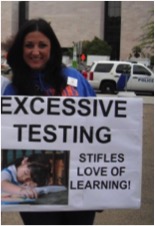By Marie LeJeune and Tracy Smiles, Western Oregon University
We must accept finite disappointment, but never lose infinite hope.
Martin Luther King, Jr.
Over the past three weeks our focus on high stakes testing (SBAC and PARCC) has examined our personal and professional tensions in our roles as both parents and teacher educators. It is not an exaggeration to say we are deeply concerned over these movements in education and their impacts on children, teachers, and schools. So concerned that we have lost sleep, written letters to administrators, met with colleagues to brainstorm and strategize solutions, and generally wondered how we will continue to do the real work we believe in within the current constraints testing is placing on teachers and schools.
We have a colleague whose mantra around high stakes assessment and the accompanying narrowing of the curriculum is to think about expanded ways in which we as educators can become “creatively compliant and selectively defiant” (Hoffman, Assaf, Paris, 2001). These words strike a chord within us; we do believe that our philosophical ideology, our professional actions and writing, and the content of our courses examines this issue of ways that we can work within the world of schools (which we dearly love) while pushing back at restricting curricular and assessment that constrain the identities of students and teachers.
And we are not alone. While the high stakes assessment craze often seems worse than it’s ever been, there are pockets of resistance where multiple stakeholders—administrators, teachers, parents, and students are speaking up and against these limiting practices. For this week’s post, we want to highlight some of the ways activism is afoot as people are pushing back against the high stakes tests, the over assessment of children, and the false representations of public schools in the popular press and political circles.
Just this month, early grade Modesto teachers staged a protest at their local school board meeting about the ridiculous number of assessments they have been administering in order to meet the district’s mandate and program for monitoring student progress. Hundreds of colleagues packed the school board meeting as teachers, including first grade teacher Jennifer Hayner, gave testimony on the damaging effects of the assessments on their students and profession. Hayner explained that she has administered 2,387 tests–nearly 100 per student–during the 2014-2015 school year. Kindergarten and first grade teachers provided the board with testing materials that they estimated took three months out of the school year to administer. Veteran teachers Jennifer McGrath and Erica Middough told the board outright that it’s time for the district to trust its teachers, advising the board, “….drastically take and do away with our current assessments. It’s time to listen to and meet the needs of the students. It’s time to assess our students less and teach more.” Teachers also spoke at board meetings in November and February, Modesto Teachers Association President Doug Burton reported. “Morale is the lowest I’ve seen it in 24 years in the district,” Burton told the Modesto Bee, “Teachers are not complaining about having to get data. They’re complaining that the tail is wagging the dog,” he said, explaining data has become the focus, instead of children. This school district serves a population where approximately 85 percent of the children live in poverty; concerns for lack of instructional time and the impact on children’s identities are very real and their ‘push back’ is rooted in their knowledge that their students are in true need of more teaching and learning and less testing. You can read more about the Modesto teacher protest here.
Other stories of activism, push back, and test refusal are linked below:
• A collective of educational researchers have signed this oppositional statement to test based accountability and teacher evaluations systems.
• Diane Ravitch pushes back against more limited rhetoric from Arne Duncan, with this thoughtful piece, “How to fix No Child Left Behind.”
• How far will Pearson go to enforce testing? This week we learned that they are monitoring more than children’s school testing.
• Examining the far-reaching effects of standardized testing in “When a Teacher’s Job Depends on a Child’s Test.”
• An excellent article that sets ‘ed reformers’ straight about what children really need. Hint: It’s not more tests!
Some of our Favorite Allies (and there are many more):
For the Future of Our Children, We Stand Strong in Support of . . .
• Equitable funding across all public schools and school systems
• An end to high stakes testing used for the purpose of student, teacher, and school evaluation
• Teacher, family, and community leadership in forming public education policies
• Curriculum responsive to and inclusive of local school communities
• Professional, qualified, and committed teachers in all public schools
For more information on each principle: Paths towards true Progress in Public Education.
Badass Teachers Association was created to give voice to every teacher who refuses to be blamed for the failure of our society to erase poverty and inequality through education. BAT members refuse to accept assessments, tests and evaluations created and imposed by corporate driven entities that have contempt for authentic teaching and learning.
The Badass Teacher Association (BATs) is a large and growing grassroots movement of teachers. The BATs movement includes very active use of social media such as Facebook, blogs, and a website that includes articles about up to date developments in education, information about planned marches and protests, and links to local and state BAT groups.
United Opt Out National, Inc. is registered as a nonprofit organization incorporated in the state of Florida. Members of this site are parents, educators, students and social activists who are dedicated to the elimination of high stakes testing in public education. We use this site to collaborate, exchange ideas, support one another, share information and initiate collective local and national actions to end the reign of fear and terror promoted by the high stakes testing agenda.
We hoped to provide in this week’s post links to stories that will both inspire readers to consider ways they can effectively resist mandates that are harmful to children. In addition to these stories, we recommend these organizations and the other organizations linked on their websites as places to find up to date information about testing issues and organized movements in protest to these harmful policies, as well as a myriad of resources.
To echo the powerful words of Dr. Martin Luther King, we recognize this work is hard and the disappointments many, but if history has taught us anything, it’s that seemingly powerless individuals can achieve amazing feats and enact social change through collaboration and solidarity. We hope readers find some solidarity in the stories we shared and websites we recommend.
State-by-state articles and movements:
Arkansas: Parents Frustrated by PARCC Test Confusion
California: California Suspends Use of Test Scores to Evaluate School Quality
California: Families Exercise Legal Right to Opt Their Children Out of Standardized Tests
Colorado: Students Explain Protest Movements
Colorado: State School Board Rejects High “Cut Scores” on Controversial New Test
Connecticut: Teachers Propose State Testing Overhaul
Connecticut: Superintendents Offer Alternative Assessment Vision
Delaware: Governor Planning Review of All State Testing
Delaware: Opt Outs Spread as Delaware Testing Begins
Florida: Testing Fails Every Educational Standard
Florida: Chaotic Florida Testing Rollout Frustrates Parents and Officials
Georgia: Test Cheating Trial Final Arguments Begin
Idaho: Teachers Push Back Against Plan to Blame Them for Low Student Scores
Illinois: Parents Seek PARCC Opt-Out Legislation
Illinois: PARCC Testing Begins With Pushback, Confusion
Illinois: The Battle Over Standardized Testing in Chicago
Indiana: Student Testing Protests Applauded
Indiana: School Super Blasts Plan to Award $134 Million in Testing Contracts Primarily to Pearson
Louisiana: Testing Coordinators Concerned About PARCC Exam Security
Louisiana: Billboard Promotes Louisiana Opt Out
Maine: Opt-Outs Send Strong Message to Schools
Maine: Standardized Testing is the Problem, Not Right to Opt Out
Maryland: Letter to the Editor: No Law Requires Child to Take Standardized Test
Maryland: Some Students Start Opting Out of Tests
Massachusetts: Governor Promises Review of State Plan to Move to PARCC Tests
Massachusetts: Beyond MCAS and PARCC: Sat. March 21 Conference on Alternative Assessments That Work
Minnesota: Schools Have Too Much Testing
Minnesota: Opt Out Push Urges Minnesota Families to Buck Standardized Tests
Mississippi: Parents Protest PARCC; Tell Kids to Skip Tests
Mississippi: Mississippi Seeks New Testing Vendor
New Jersey: New Jersey Families Lead Opt-Out Movement
New Jersey: Test Refusals Higher Than Expected in Many New Jersey Communities
New Mexico: Schools Elevate Testing Over Teaching
New Mexico: More Than 5% Opt Out at Several Santa Fe Schools
New York: Opt-Out Rally Draws 1,000+
New York: Teachers Union Backs Opt Out Right
New York: Where a Teacher’s Job Depends on Students’ Test Scores
New York: Six Questions for Arne Duncan About Teacher Evaluation
Ohio: Testing Protest Stories Dominate Education News
Ohio: Legislature Passes Bill to Protect Students From Testing Impact
Oklahoma: Educators Launch “Common Sense Testing Tour”
Oregon: Bills to Determine Fate of Statewide Exams
Oregon: Students Need Less Testing, Better Education
Pennsylvania: Officials Worry About Scheduling Project-Based Assessments
Pennsylvania: English Language Learners Fuel Philadelphia Opt-Out Movement
Pennsylvania: New Analysis Questions Pennsylvania School Performance Rating Systems
Rhode Island: Bill Would Allow Students to Opt Out of Tests Without Penalty
Rhode Island: Students Protest Dismissal of Test-Critic Teachers
South Dakota: Common Core Exams Test Schools’ Technical Readiness
Texas: A-F School Grades Flunked by Public Education Advocates
Wisconsin: Cuts Back Length of New Common Core Test
Wisconsin: Legislature Fast-Tracking Bill to Pause Use of Test Scores to Judge Teachers and Schools
Yong Zhao: How Should Learning Be Assessed
Journey through Worlds of Words during our open reading hours: Monday-Friday, 9 a.m. to 5 p.m. and Saturday, 9 a.m. to 1 p.m. To view our complete offerings of WOW Currents, please visit archival stream.
- Themes: Marie LeJeune, Tracy Smiles
- Descriptors: Debates & Trends, WOW Currents



